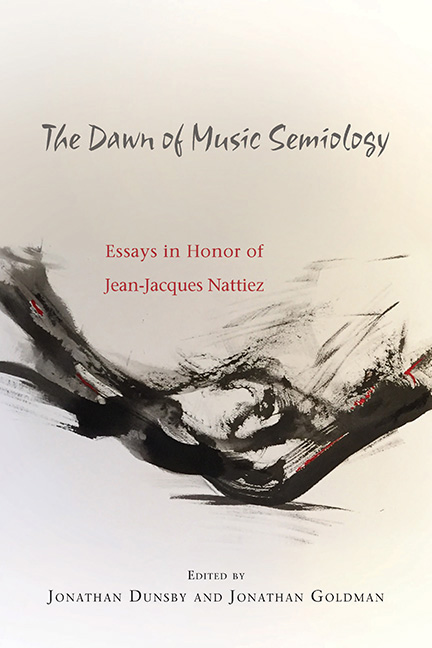Introduction
Published online by Cambridge University Press: 26 April 2018
Summary
The aim of this book is to present some of the latest thinking about the nature and purpose of music semiology. It is not only a repository of new scholarship in an exciting area of general musicology but also a tribute to Jean-Jacques Nattiez, who in anyone's account of the last half century would be considered the founder of this discipline.
The word dawn in the title of this book refers to the fact that music semiology— which arrived on the musicological, and particularly the musictheoretical, scene in French, in 1976, through Nattiez's pioneering study Fondements d'une sémiologie de la musique—is young, vibrant, and certainly not fully formed. In recent decades other strands of musicological thinking have emerged that can be regarded as spawned by music semiology, explicitly or otherwise. These alone are indications of the labile state of the recent history of ideas as discernible in current musical scholarship. Although the boundaries are anything but clear, as some of the present book indicates, music semiotics, which has aimed to distinguish its methods from those of music semiology, could hardly have emerged as the prodigious research field it now is without the impetus that came from the poststructuralist thinking of the 1980s, largely stimulated by Fondements and Nattiez's other publications from the earliest days of music semiology. Similarly, the development, especially in music theory circles in recent years, of “narrative” approaches to musical explanation has been riding the same wave of hermeneutical explorations of music as the semiologist Jean Molino, Nattiez's principal influence. The development of narrative approaches will be discussed further, as will Molino's concept of the “total symbolic fact.” It is no accident that it was Nattiez himself, according to one authority, who first used the term new musicology in print, applying it to research revealing the antistructuralist urges that had begun to characterize the work of younger historical musicologists. In Nattiez's view, these scholars lacked the aesthetic conviction that would have lent them some enduring hermeneutical value.
- Type
- Chapter
- Information
- The Dawn of Music SemiologyEssays in Honor of Jean-Jacques Nattiez, pp. 1 - 8Publisher: Boydell & BrewerPrint publication year: 2017



